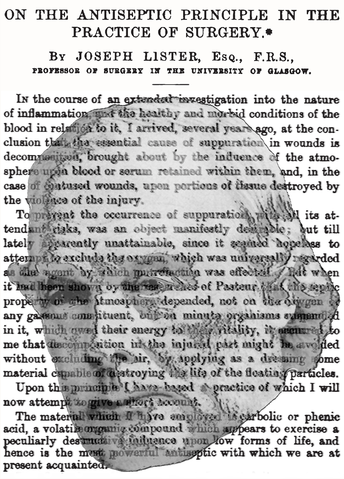Joseph Lister1827–1912
Undergoing surgery was a dangerous enterprise prior to the introduction of sterilisation procedures: patients often died afterwards from the ubiquitous ‘ward fever’. Prior to the work of Louis Pasteur (1822-1895) on micro-organisms, it was considered that post-operative infections were a consequence of ‘bad air’ circulating in hospital wards. Influenced by Pasteur’s research, Lister introduced the use of carbolic acid (phenol) first to cover the open wounds from operations, then in hand-washing and finally for cleaning surgical instruments. All these procedures reduced post-operative infection rates, and they were widely adopted. Lister’s methods were introduced when he was Regius Professor of Surgery at Glasgow University. Prior to that he had worked in London and Edinburgh, and had been present at the first operation carried out under anaesthetic (in 1846). Lister is portrayed in the text of his article (published in the September, 1867 issue of The British Medical Journal) announcing the use of antiseptic procedures in surgery. He subsequently moved to chairs of surgery at Edinburgh and then King’s College London. Lister received widespread recognition for his work. He was created a baronet in 1883 and became Baron Lister in 1897. He served as President of the Royal Society from 1895 to 1900, and there are many prizes and tributes now associated with his name.
